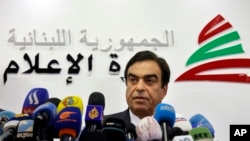Lebanese Information Minister George Kordahi resigned Friday after criticizing Saudi-backed forces in the Yemen conflict, comments that raised tension between Lebanon’s new government and Arab Gulf countries.
Analysts say Kordahi’s resignation may help unlock the crises with Gulf states that have hamstrung Lebanon's fledgling cabinet since October, but with Hezbollah still in charge, there might not be much improvement
The Hezbollah-supported former information minister, tendered his resignation on al-Jadeed TV, saying “Lebanon is more important than George Kordahi and the interests of the Lebanese are more important than my position.”
Kordahi, a former game show host, had said Iran-backed Houthi rebels in Yemen were acting in self-defense against the Saudi-backed coalition. The minister resisted calls to step down, saying his remarks were made before he took up his cabinet post.
But Saudi Arabia retaliated by expelling Lebanon’s ambassador, recalling its envoy to Beirut and banning imports, which once brought in $240 million a year to prop up Lebanon’s failing economy. Gulf allies also took punitive steps.
The measures raised anxiety for many Lebanese expatriates working in the Gulf and whose families back home badly need the foreign remittances. Saudi Arabia has been a traditional backer of Lebanon, but its regional rivalry with Iran and its unease over Iran-backed Hezbollah have hurt relations.
Political analyst Dania Koleilat Khatib, with the Issam Fares Institute at the American University of Beirut, told VOA that Kordahi’s resignation likely won’t do much to remedy ties.
“Maybe it will resolve it on the surface of it in the sense, now that Kordahi is gone, they‘ll bring back the ambassador. But the crux of the problem is still there. The Gulf does not want to support a Hezbollah-controlled government. So, just to save face they can resume diplomatic relations. Actually, the damage is done,” Khatib added.
Lancaster University's Simon Mabon called the situation “a complex chess game.” Observers wonder whether Qatar may still provide a bit of funding after the visit by Lebanese President Michel Aoun earlier this week.
Analyst Khatib says it’s unclear. “I think the Gulf still has interest in Lebanon. But for sure they won’t go through the government controlled by Hezbollah. It’s a corrupt government. Any money will go down the drain.”
Lebanon’s financial meltdown and other crises have plunged more than three quarters of its 6 million people and a million Syrian refugees into poverty.




